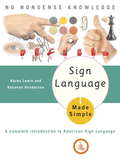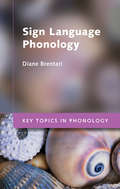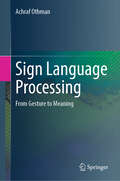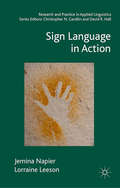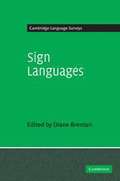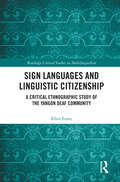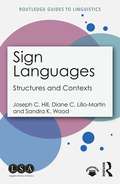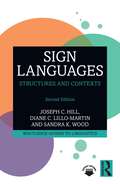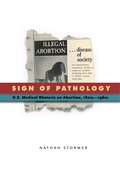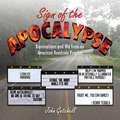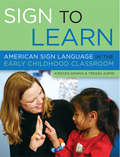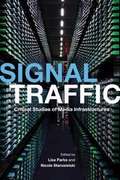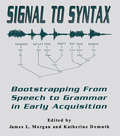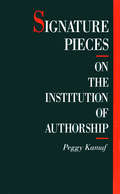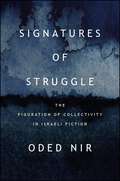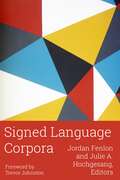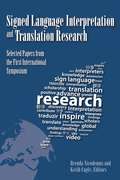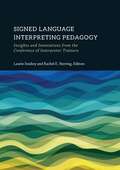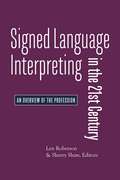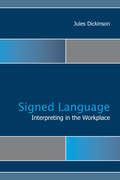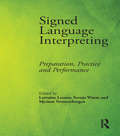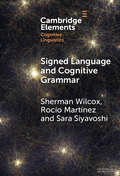- Table View
- List View
Sign Language Made Simple
by Karen LewisSign Language Made Simple will include five Parts:Part One: an introduction, how to use this book, a brief history of signing and an explanation of how signing is different from other languages, including its use of non-manual markers (the use of brow, mouth, etc in signing.)Part Two: Fingerspelling: the signing alphabet illustrated, the relationship between signing alphabet and ASL signsPart Three: Dictionary of ASL signs: concrete nouns, abstractions, verbs, describers, other parts of speech-approx. 1,000 illustrations. Will also include instructions for non-manual markers, where appropriate.Part Four: Putting it all together: sentences and transitions, includes rudimentary sentences and lines from poems, bible verses, famous quotes-all illustrated. Also, grammatical aspects, word endings, tenses.Part Five: The Humor of Signing: puns, word plays and jokes.Sign Language Made Simple will have over 1,200 illustrations, be easy to use, fun to read and more competitively priced than the competition. It's a knockout addition to the Made Simple list.
Sign Language Phonology (Key Topics in Phonology)
by Diane BrentariA concise overview of key findings and ideas in sign language phonology and its contributions to related fields, including historical linguistics, morphology, prosody, language acquisition and language creation. Working on sign languages not only provides important new insights on familiar issues, but also poses a whole new set of questions about phonology, because of the use of the visual communication modality. This book lays out the properties needed to recognize a phonological system regardless of its modality. Written by a leading expert in sign language research, the book describes the current state of the field and addresses a range of issues that students and researchers will encounter in their work, as well as highlighting the significant impact that the study of sign languages has had on the field of phonology as a whole. It includes lists of further reading materials, and a full glossary, as well as helpful illustrations that demonstrate the important aspects of sign language structure, even to the most unfamiliar of readers. A text that will be useful to both specialists and general linguists, this book provides the first comprehension overview of the field.
Sign Language Processing: From Gesture to Meaning
by Achraf OthmanIn a world where communication is key to human connection, understanding, and learning from one another, the book investigates the rich and intricate world of sign languages, highlighting the fascinating complexities of visual-spatial languages and their unique role in bridging the gap between hearing and deaf communities through information and communication technology. The book takes a journey through the evolution of sign language processing tools while exploring the cutting-edge techniques used to decipher, analyze, and process them, from the fundamentals of sign language structure and the nuances of non-manual signals to the latest developments in computational linguistics (corpora design, annotation tools, and notation systems), sign language recognition, and machine/deep learning applications. With a mission to reveal the silent language of expression, the author provides a captivating and thought-provoking look into a world often overlooked yet teeming with life and meaning. Offering a comprehensive and engaging overview of the current state of sign language research as well as its prospects, this monograph is an introduction resource for computer scientists, linguistics, educators, academics and sign language interpreters alike. This monograph is an invitation to discover the incredible potential of sign languages to transform human communication, promote inclusivity, and shape the future of technology. The readers will gain a deeper appreciation of the beauty and complexity of sign languages through technology, and they will be inspired to embrace the power of visual communication in our increasingly diverse and interconnected world.
Sign Language in Action (Research and Practice in Applied Linguistics)
by Jemina Napier Lorraine LeesonThis book defines the notion of applied sign linguistics by drawing on data from projects that have explored sign language in action in various domains. The book gives professionals working with sign languages, signed language teachers and students, research students and their supervisors, authoritative access to current ideas and practice.
Sign Languages
by Diane BrentariThis series offers general accounts of the major language families of the world, with volumes organized either on a purely genetic basis or on a geographical basis, whichever yields the most convenient and intelligible grouping in each case. Each volume compares and contrasts the typological features of the languages it deals with. It also treats the relevant genetic relationships, historical development, and sociolinguistic issues arising from their role and use in the world today. The books are intended for linguists from undergraduate level upwards, but no special knowledge of the languages under consideration is assumed. Volumes such as those on Australia and the Amazon Basin are also of wider relevance, as the future of the languages and their speakers raises important social and political issues.
Sign Languages and Linguistic Citizenship: A Critical Ethnographic Study of the Yangon Deaf Community (Routledge Critical Studies in Multilingualism)
by Ellen FooteThis critical ethnographic account of the Yangon deaf community in Myanmar offers unique insights into the dynamics of a vibrant linguistic and cultural minority community in the region and also sheds further light on broader questions around language policy. The book examines language policies on different scales, demonstrating how unofficial policies in the local deaf school and wider Yangon deaf community impact responses to higher level interventions, namely the 2007 government policy aimed at unifying the country’s two sign languages. Foote highlights the need for a critical and interdisciplinary approach to the study of language policy, unpacking the interplay between language ideologies, power relations, political and moral interests and community conceptualisations of citizenship. The study’s findings are situated within wider theoretical debates within linguistic anthropology, questioning existing paradigms on the notion of linguistic authenticity and contributing to ongoing debates on the relationship between language policy and social justice. Offering an important new contribution to critical work on language policy, the book will be of particular interest to students and scholars in sociolinguistics, linguistic anthropology and language education.
Sign Languages: Structures and Contexts (Routledge Guides to Linguistics #13)
by Joseph C. Hill Diane C. Lillo-Martin Sandra K. WoodSign Languages: Structures and Contexts provides a succinct summary of major findings in the linguistic study of natural sign languages. Focusing on American Sign Language (ASL), this book: offers a comprehensive introduction to the basic grammatical components of phonology, morphology, and syntax with examples and illustrations; demonstrates how sign languages are acquired by Deaf children with varying degrees of input during early development, including no input where children create a language of their own; discusses the contexts of sign languages, including how different varieties are formed and used, attitudes towards sign languages, and how language planning affects language use; is accompanied by e-resources, which host links to video clips. Offering an engaging and accessible introduction to sign languages, this book is essential reading for students studying this topic for the first time with little or no background in linguistics.
Sign Languages: Structures and Contexts (Routledge Guides to Linguistics)
by Joseph C. Hill Sandra K. Wood Diane C. Lillo-MartinSign Languages: Structures and Contexts provides a succinct summary of major findings in the linguistic study of natural sign languages. Focusing on American Sign Language (ASL), this book offers a comprehensive introduction to the basic grammatical components of phonology, morphology, and syntax with examples and illustrations.Revised throughout, this new edition: demonstrates how sign languages are acquired by Deaf children with varying degrees of input during early development, including no input where children create a language of their own discusses the contexts of sign languages, including how different varieties are formed and used, attitudes toward sign languages, and how language planning affects language use includes a new chapter on the similarities between signed and spoken languages offers additional visuals and explanations as well as more coverage of signed languages other than ASL is accompanied by updated online support material, which hosts links to video clips This engaging and accessible introduction to sign languages is essential reading for students studying this topic for the first time with little or no background in linguistics.
Sign of Pathology: U.S. Medical Rhetoric on Abortion, 1800s–1960s (RSA Series in Transdisciplinary Rhetoric #1)
by Nathan StormerMuch of the political polarization that grips the United States is rooted in the so-called culture wars, and no topic defines this conflict better than the often contentious and sometimes violent debate over abortion rights. In Sign of Pathology, Nathan Stormer reframes our understanding of this conflict by examining the medical literature on abortion from the 1800s to the 1960s. Often framed as an argument over a right to choose versus a right to life, our current understanding of this conflict is as a contest over who has the better position on reproductive biology. Against this view, Sign of Pathology argues that, as it became a medical problem, abortion also became a template, more generally, for struggling with how to live—far exceeding discussions of the merits of providing abortions or how to care for patients. Abortion practices (and all the legal, moral, and ideological entanglements thereof) have rested firmly at the center of debate over many fundamental institutions and concepts—namely, the individual, the family, the state, human rights, and, indeed, the human. Medical rhetoric, then, was decisive in cultivating abortion as a mode of cultural critique, even weaponizing it for discursive conflict on these important subjects, although the goal of the medical practice of abortion has never been to establish this kind of struggle. Stormer argues that the medical discourse of abortion physicians transformed the state of abortion into an indicator that the culture was ill, attacking itself during and through pregnancy in a wrongheaded attempt to cope with reproduction.
Sign of the Apocalypse: Ruminations and Wit from an American Roadside Prophet
by John GetchellFriends, neighbors, and passersby from all over the country can’t fail to miss “The Sign’s constantly changing humor and insight. On occasion, The Sign of the Apocalypse (SOTA) traffics in the earnest, but at its heart is rooted in a deep-seated desire to express the sarcastic and snort-worthy. This, and a love of haiku, pizza, Latin, double entendre, and the worst puns ever crafted. Two years in the making, the message on “The Sign” is changed on a daily basis, with the primary benefit of slowing passing traffic to a honking crawl. It was designed to convey pithy tidbits of thought and wordplay. In its conception, SOTA was perpetrated in spite of the objection of the author's girlfriend, and with hopes of creating controversy and dismay in the local community. The girlfriend packed up and left, and the community and town fathers were surprisingly gruntled by the proceedings. Punny and sarcastic signs include: • When attacked by a gang of clowns, go for the juggler • What if doing the hokey pokey really is what it’s all about? • Legalize marinara • A penny saved is ridiculous • Wendy, please take me back / I’m so miserable / it’s almost like / you’re still here
Sign to Learn
by Kirsten Dennis Tressa AzpiriEveryone is talking about signing with young children. As a form of early communication for infants and toddlers, or as a transitioning tool for children just beginning to speak, the benefits of signing with hearing children are endless.Sign to Learn is the first complete introduction to sign language curriculum for hearing preschoolers. In this unique resource, you will learn how to integrate American Sign Language (ASL) into your classroom to enhance the academic, social, and emotional development of children, and how to respectfully introduce children to Deaf culture.This comprehensive, fully illustrated curriculum contains captivating activities and lesson plans grouped by themes, including feelings, food, seasons, animals, songs, and families. Sign to Learn also contains strategies for using sign language with children with special needs and in multilingual classrooms, and it describes how ASL can assist you in developing a literacy program and in managing your classroom.Information-rich appendices include a thorough ASL illustration index, sample letters to families, and resources for further reading.
Signal Traffic: Critical Studies of Media Infrastructures (The Geopolitics of Information)
by Nicole Starosielski Lisa ParksThe contributors to Signal Traffic investigate how the material artifacts of media infrastructure--transoceanic cables, mobile telephone towers, Internet data centers, and the like--intersect with everyday life. Essayists confront the multiple and hybrid forms networks take, the different ways networks are imagined and engaged with by publics around the world, their local effects, and what human beings experience when a network fails. Some contributors explore the physical objects and industrial relations that make up an infrastructure. Others venture into the marginalized communities orphaned from the knowledge economies, technological literacies, and epistemological questions linked to infrastructural formation and use. The wide-ranging insights delineate the oft-ignored contrasts between industrialized and developing regions, rich and poor areas, and urban and rural settings, bringing technological differences into focus. Contributors include Charles R. Acland, Paul Dourish, Sarah Harris, Jennifer Holt and Patrick Vonderau, Shannon Mattern, Toby Miller, Lisa Parks, Christian Sandvig, Nicole Starosielski, Jonathan Sterne, and Helga Tawil-Souri.
Signal to Syntax: Bootstrapping From Speech To Grammar in Early Acquisition
by James L. Morgan Katherine DemuthIn the beginning, before there are words, or syntax, or discourse, there is speech. Speech is an infant's gateway to language. Without exposure to speech, no language--or at most only a feeble facsimile of language--develops, regardless of how rich a child's biological endowment for language learning may be. But little is given directly in speech--not words, for example, as anyone who has ever listened to fluent conversation in an unfamiliar language can attest. Rather, words and phrases, or rudimentary categories--or whatever other information is required for syntactic and semantic analyses to begin operating--must be pulled from speech through an infant's developing perceptual capacities. By the end of the first year, an infant can segment at least some words from fluent speech. Beyond this, how impoverished or rich an infant's representations of input may be remains largely unknown. Clearly, in the debate over determinants of early language acquisition, the input speech stream has too often been offhandedly dismissed as a potential source of information.This volume brings together internationally-known scholars from a range of disciplines--linguistics, psychology, cognitive and computer science, and acoustics --who share common interests in how speech, in its phonological, prosodic, distributional, and statistical properties, may encode information useful for early language learning, and how such information may be deciphered by very young children. These scholars offer a spectrum of viewpoints on the possibility that aspects of speech may provide bootstraps for language learning; contribute important, state-of-the-art findings across a variety of relevant domains; and illuminate critical directions for future inquiry. The publication of this volume represents a significant step in renewing the bonds between two fields that have long been sundered--speech perception and language acquisition.
Signalling Nouns in English
by John Flowerdew Richard W. ForestSignalling nouns (SNs) are abstract nouns like 'fact', 'idea', 'problem' and 'result', which are non-specific in their meaning when considered in isolation and specific in their meaning by reference to their linguistic context. SNs contribute to cohesion and evaluation in discourse. This work offers the first book-length study of the SN phenomenon to treat the functional and discourse features of the category as primary. Using a balanced corpus of authentic data, the book explores the lexicogrammatical and discourse features of SNs in academic journal articles, textbooks, and lectures across a range of disciplines in the natural and social sciences. The book will be essential reading for researchers and advanced students of semantics, syntax, corpus linguistics and discourse analysis, in addition to scholars and teachers in the field of English for academic purposes.
Signature Pieces: On the Institution of Authorship
by Peggy KamufSome contemporary approaches to literature still accept the separation of historical, biographical, external concerns from formal, internal ones. On the borderline that lends this division between inside and outside its apparent coherence is signature. In Peggy Kamuf’s view, studying signature will help us to rediscover some of the stakes of literary writing beyond the historicist/formalist opposition. Drawing on Derrida’s extensive work on signatures and proper names, Kamuf investigates authorial signature in key writers from Rousseau to Woolf, as well as the implications of signature for the institutions of authorship and criticism.
Signatures of Struggle: The Figuration of Collectivity in Israeli Fiction (SUNY series in Contemporary Jewish Literature and Culture)
by Oded NirSignatures of Struggle offers a unique perspective on Israeli literature, bringing Marxist cultural critique to bear on a field from which it has hitherto been absent. Oded Nir moves beyond the dominant interpretive horizon of Israeli literary criticism: the relation of literature to national ideology. Rather than reproducing the usual narrative in which fiction resists the nation's goals, Nir demonstrates how, in each historical moment, literary engagement with national ideology is a means to think through social tensions or contradictions internal to Israeli society—to solve in imagination problems that threaten the social order. Focusing on moments of transformation, Nir argues that the 1950s crisis of realism was the result of the failure, rather than the success, of the collective transformative project of the haluzim, the settler vanguard of Zionism. In the 1980s, the postmodern turn expressed a crisis of social imagination, whose origin was the incorporation of Palestinians into the Israeli economy after the 1967 war. Finally, he shows that the ways in which history is imaginatively reworked in contemporary Israeli fiction can only be understood through the context of 1950s and 1980s literature. Authors analyzed include Yigal Mossinsohn, Nathan Shaham, Hanoch Bartov, Yehudit Hendel, Orly Castel-Bloom, Yehudit Katzir, David Grossman, Yehoshua Kenaz, and Batya Gur.
Signatures: Rare Finds
by Roger C. Farr Dorothy S. StricklandIn Rare Finds, you will meet many people who have made rare finds. You may find a character you can relate to and learn from, or some information that starts you on a process of discovery.
Signed Language Corpora (Gallaudet Sociolinguistics #25)
by Jordan Fenlon Julie A. HochgesangJordan Fenlon and Julie A. Hochgesang present a revolutionary contribution to the field of signed language linguistics with Signed Language Corpora, the first volume to provide a comprehensive overview of the creation, development, and use of signed language corpora. This work will advance discussions on corpus linguistics as a methodology and its place in signed language linguistics research. The ability to search corpora to obtain information about the frequency of patterns in language is an important step forward for signed language research. Access to large datasets will expand scholarly understandings of signed language structure in ways never before possible. Through reflective discussions on the processes of creating, using, and utilizing corpora, the editors and contributors hope that other linguists will be inspired to take similar steps. The descriptions provided in this book have been written to provide a framework for those eager to develop or make use of signed language corpora for their respective signed language varieties. Creating signed language corpora is significant not only for linguistic research, but for the long-term preservation of collected texts that include the stories and histories of signed language communities. Additional areas of focus include the use of signed language corpora in applied settings, the ethics of working with signed language communities, and the future of this methodology in research.
Signed Language Interpretation and Translation Research: Selected Papers from the First International Symposium
by Keith Cagle Brenda NicodemusThis volume brings together the best research presented at the first International Symposium on Signed Language Interpreting and Translation Research. Editors Brenda Nicodemus and Keith Cagle have gathered an international group of contributors who are recognized leaders in signed language interpreter education and research. The ten papers in Signed Language Interpretation and Translation Research cover a range of topics, including the need for Deaf perspectives in interpretation research, discourse strategies and techniques that are unique to video relay call settings, the benefits of using sociology as a lens for examining sign language interpreting work, translating university entrance exams from written Portuguese into Libras (Brazilian Sign Language), the linguistic choices interpreters make when interpreting ASL figurative language into English, the nature of designated interpreting, and grammatical ambiguity in trilingual VRS interpreting. The research findings and insights contained here will be invaluable to scholars, students, and practitioners.
Signed Language Interpreting Pedagogy: Insights and Innovations from the Conference of Interpreter Trainers (The Interpreter Education Series #13)
by Laurie Swabey Rachel E. HerringFor over forty years, the Conference of Interpreter Trainers has provided opportunities for advancing teaching and learning in interpreter education. This volume highlights fifteen seminal papers from past conference proceedings, along with newly written responses to the selected papers. Many of the new contributions are co-written by the author of the original paper and one or more emerging scholars, giving readers a historical lens on how the field of signed language interpreting pedagogy has evolved. The volume also calls attention to issues with which the field must urgently contend, such as implementing a Deaf-centric approach, multicultural interpreting curricula, the recruitment and retention of African American/Black students, and social justice. The contributors explore other important topics in interpreter education including ethics, Deaf translation, performance evaluation, consecutive and simultaneous interpreting, discourse analysis, critical thinking, curriculum sequencing, the social construction of learning, and mentoring. Through this collaborative approach featuring more than thirty scholars, Signed Language Interpreting Pedagogy presents a wealth of theoretical and practical information for interpreter educators and their students.
Signed Language Interpreting in the 21st Century: An Overview of the Profession
by Len Roberson Sherry ShawThis text provides interpreting students with a broad knowledge base that encompasses the latest research, addresses current trends and perspectives of the Deaf community, and promotes critical thinking and open dialogue about the working conditions, ethics, boundaries, and competencies needed by a highly qualified interpreter in various settings. This volume expands the resources available to aspiring interpreters, including Deaf interpreters, and incorporates the voices of renowned experts on topics relevant to today’s practitioners. Each chapter provides students with objectives, keywords, and discussion questions. The chapters convey clear information about topics that include credentialing, disposition and aptitude for becoming an interpreter, interpreting for people who are DeafBlind, and working within specialty settings, such as legal and healthcare. A key resource for interpreter certification test preparation, this text follows the interpreter’s ethical, practical, and professional development through a career of lifelong learning and service.
Signed Language Interpreting in the Workplace
by Jules DickinsonThe last forty years have seen a dramatic change in the nature of work, with deaf people increasingly moving into white collar or office-based professions. The rise of deaf professionals has led to employment opportunities for signed language interpreters across a variety of workplace settings, creating a unique set of challenges that require specialized strategies. Aspects such as social interaction between employees, the unwritten patterns and rules of workplace behavior, hierarchical structures, and the changing dynamics of deaf employee/interpreter relationships place constraints upon the interpreter’s role and interpreting performance. Jules Dickinson’s examination of interpreted workplace interactions is based on the only detailed, empirical study of this setting to date. Using practitioner responses and transcripts of real-life interpreted workplace interactions, Dickinson’s findings demonstrate the complexity of the interpreter’s role and responsibilities. The book concentrates on the ways in which signed language interpreters affect the interaction between deaf and hearing employees in team meetings by focusing on humor, small talk, and the collaborative floor. Signed Language Interpreting in the Workplace demonstrates that deaf employees require highly skilled professionals to enable them to integrate into the workplace on a level equal with their hearing peers. It also provides actionable insights for interpreters in workplace settings that will be a valuable resource for interpreting students, practitioners, interpreter trainers, and researchers.
Signed Language Interpreting: Preparation, Practice and Performance
by Lorraine Leeson Svenja Wurm Myriam VermeerbergenSigned language interpreting continues to evolve as a field of research. Stages of professionalization, opportunities for education and the availability of research vary tremendously among different parts of the world. Overall there is continuing hunger for empirically founded, theoretically sound accounts of signed language interpreting to inform practice, pedagogy and the development of the profession. This volume provides new insights into current aspects of preparation, practice and performance of signed language interpreting, drawing together contributions from three continents. Contributors single out specific aspects of relevance to the signed language interpreting profession. These include preparation of interpreters through training, crucial for the development of the profession, with emphasis on sound educational programmes that cover the needs of service users and the wide-ranging skills expected from practitioners. Resources, such as terminology databases, are vital tools for interpreters to prepare successfully for events. Practice oriented, empirical investigations of strategies of interpreters are paramount not only to increase theoretical understanding of interpreter performance, but to provide reference points for practitioners and students. Alongside tackling linguistic and pragmatic challenges, interpreters also face the challenge of dealing with broader issues, such as handling occupational stress, an aspect which has so far received little attention in the field. At the same time, fine-grained assessment mechanisms ensure the sustainability of quality of performance. These and other issues are covered by the eighteen contributors to this volume, ensuring that the collection will be essential reading for academics, students and practitioners.
Signed Language and Cognitive Grammar (Elements in Cognitive Linguistics)
by Sherman Wilcox Rocío Martínez Sara SiyavoshiThis Elements monograph presents a Cognitive Grammar (CG) approach to a range of signed language grammatical phenomena. It begins with a background on the history of sign linguistics, focusing on what was a widely-held belief that signs are simply gestures. The first section traces the modern linguistic examination of signed languages, focusing on Stokoe and his demonstration that these languages exhibit phonology and duality of patterning. Next, we present some fundamental principles that are foundational for cognitive linguistics and sign linguistics. In a section on Cognitive Grammar, we present a brief overview of CG principles, constructs, and models. Section 4 presents extensive analyses of signed language constructions applying CG, including nominal grounding; the concepts of Place and placing; a CG approach to 'agreement' constructions in signed languages; reported dialogue; grammatical modality; and the grammatical meaning of facial displays. A final section examines the controversial role of gesture in grammatical constructions.
